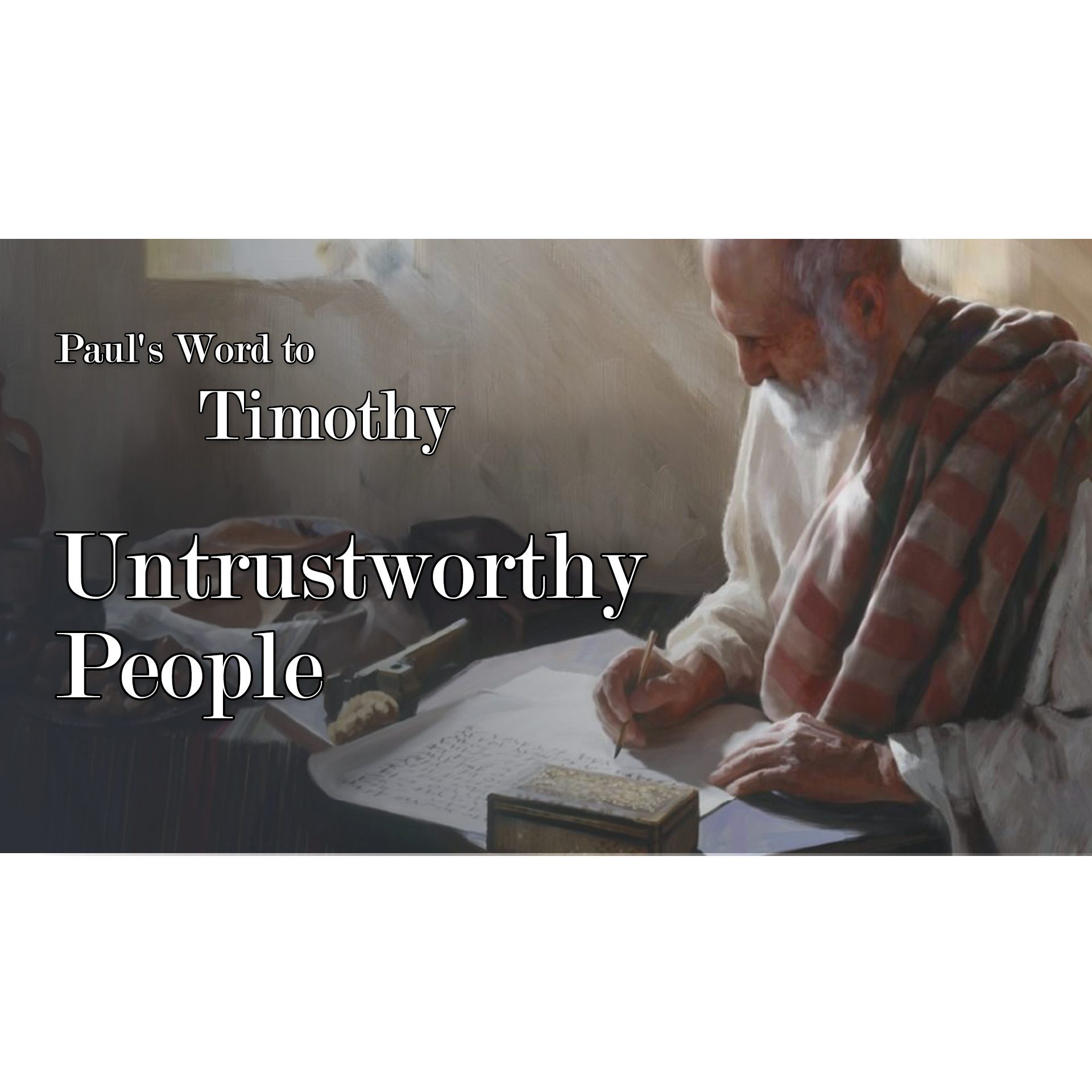Discover Ablaze Church Sermon Podcast (Audio)
Ablaze Church Sermon Podcast (Audio)

Ablaze Church Sermon Podcast (Audio)
Author: Ablaze Church
Subscribed: 1Played: 20Subscribe
Share
© Ablaze Church 2024
Description
Our purpose at Ablaze is to love God, love others, follow Jesus and to tell others. If you are looking for a church home in the Tulsa area we’d love to have you join us for worship on Saturdays at 6:30 PM or Sundays an 10:30 AM. We are located just north of 51st street on Lynn Lane in Broken Arrow. For more information, please check out our website at ablazechurch.org
201 Episodes
Reverse
We begin a new series this weekend called, “Paul’s Word to Timothy.” Timothy was, in every way, Paul’s spiritual son. Young but gifted, Timothy had been assigned to lead the church at Ephesus. The congregation that gathered in Ephesus needed order in worship as well as doctrinal correction. It was also plagued with false teachers. This letter from Paul guided and counseled young Timothy in his duties.
In Chapter Four, Jonah came to realize that God was going to spare Nineveh from destruction. Several days had elapsed since Jonah had begun preaching that Nineveh would be overturned if they did not repent. When Nineveh repented, Jonah became very angry. His anger is mentioned several times by God. In contrast, God is “slow to anger and abounds in steadfast love and faithfulness, keeping steadfast love for thousands, forgiving iniquity and transgression of sin” (Ex. 34:6-7).
The people of Nineveh hardly seem like prospects for responding to God’s Word because they were not Jewish, yet they did turn from their sin, fasted, and put on sackcloth. Upon seeing their turn from evil, God relented from sending disaster. We thank God that His Word bore the fruit of repentance in Nineveh and in our lives.
Have you ever asked, “How low can you (or I) go?” It is just a figure of speech, but it definitely has a scary meaning behind it. In our reading from Jonah Chapter 2, we will see how low a prophet of God is allowed to go. Some might say, “You can’t get any lower than Jonah.” God wanted Jonah to go to Ninevah, but he ended up below sea level. The good news is, that after three days in the belly of a great fish, Jonah finally reconsidered going to Ninevah.
We begin a post-Easter new series, based on the Old Testament book of Jonah. This is one of the most compelling and well-known stories in the Bible. It is full of drama, action, human interest, and practical lessons for Christians and for the Church today as it teaches us to remain true to our calling and mission. When we drift away from it, God may intervene dramatically to get us back on track.
Easter is not merely a one-day celebration, it is a fifty-day season from the Day of the Resurrection of our Lord to the Day of Pentecost. During the Easter Season, we have a tradition to greet one another with a special Easter greeting and response, “Alleluia Christ is Risen!” “He is risen indeed! Alleluia!”
Beginning with Chapter 14 of Mark we learn about how desperate the Jewish leaders were to find a way to execute Jesus quickly and quietly before He gained full support for His mission. Yet, God is at work even in these events using the opposition of His enemies for the fulfillment of His plan of salvation for mankind. The Lord is likewise at work in the events of our lives today bringing about good even amid suffering. We must trust that He has a plan for all that happens in our lives.
Rather than being an external regimented, dry list of rules, Jesus describes the commandments as being centered on loving God and our neighbor. We are told that the greatest commandment is to love God with all our being; that is, with all our heart, soul, and mind. This Jesus calls the most important commandment. Then Jesus shares what is the second most important commandment, which is to love our neighbors as ourselves. These two commandments Jesus sees and explains as the heart of the Old Testament, revealed by the law and the prophets.
Jesus’ triumphal entry into Jerusalem is the place He openly accepted messianic titles and at the same time fulfilled many Old Testament messianic prophecies. The disciples and the crowds expected Jesus to establish an earthly kingdom. The express purpose of Jesus’ arrival into Jerusalem was to usher in God’s plan of salvation for mankind. Jesus entered Jerusalem in humility to fulfill the plan of salvation by laying down His life for sinners.
The transfiguration was an event where Jesus showed the light of His heavenly divinity. Jesus was metamorphosized before three of the disciples to display His divine glory and to prepareHis disciples for His death and resurrection. At this historical event, two Old Testament figuresappeared, Moses and Elijah, to verify who Jesus was and what was to happen to Him.The glory of Jesus reminds us that He freely chose death and resurrection for our sakes. Thisshould make us all the more want to listen to Him.
The Pharisees were that Jewish sect or part which laid utmost stress on the strictest outward observances of the law, including the traditions of man. In fact, many Pharisees and Scribes held traditional law over and above God’s law. Jesus exposes their self-righteousness as arrant hypocrites. The Pharisees and Scribes expected the disciples and Jesus to follow their ritual practices. Jesus quotes Isaiah to rebuke their hypocrisy and then gives them a concrete example of their false piety. He describes how they fail to follow the fourth commandment, “to honor your father and mother” so they can follow man-made observances.
John the Baptist was beheaded by King Herod Antipas. According to the New Testament, Herod Antipas was ruler of Galilee under the Roman Empire. He had imprisoned John because he had publicly reproved Herod for divorcing his first wife and unlawfully taking his sister-in-law as his second wife. Her name was Herodias. She had a grudge against John for speaking against the marriage.
In the reading for this week, Jesus comes upon a man who has many unclean spirits within him. When asked his name, he said, “My name is Legion.” This man called Legion treats Jesus with more respect and honor than the Jewish people who live in the nearby country. From this historical account of Jesus casting out many demons from this man, we learn that Jesus has power over demons; yet, the people who saw the miracle wanted Jesus to leave and they wanted nothing to do with Him. The people begged Jesus to leave, while the healed man begged Jesus to go with him.
As far as we know, the first parable spoken by Jesus is the one about the sower. The parable is typical of the Palestine region where the grain is sown by hand. Jesus calls for close attention to the meaning of this parable, for it reveals a “secret” of the Kingdom of God. A parable is a simple story used to illustrate a moral or spiritual lesson. The lesson or mystery Jesus reveals is for His followers – not for those who do not believe. The exposition for this parable is revealed by Jesus in Chapter 4 of Mark.
Jesus asks a very important question in Mark Chapter 3, “Who are my mother and my brothers?” He answers the question by pointing out that people who do the will of God are His, “brother and sister and mother” (Mark 3:35). This weekend we will take a close look at the crowds that follow Jesus and what they say about Him. Included in these crowds are His physical mother and half brothers.
In Mark Chapter 2, Jesus outrages His critics called the Pharisees by calling Matthew the tax collector to follow Him. Furthermore, Jesus then eats with Matthew and other equally “defiled” people according to the Pharisees. This story invites us to reflect on whether we are more like the “defiled” people of this story, or like those who criticized Jesus. Thankfully we will read about Jesus who brings healing and forgiveness to all, even well-known sinners and smug hypocrites. In Chapter Two of Mark, we learn of Jesus’ authority over sickness, sin, and critics.
It is believed Mark wrote his Gospel for the benefit of gentile readers. Important issues for gentiles are carefully inserted into his Gospel. That is why the Gospel of Mark is the shortest of the four Gospels and why he seldom refers to the Old Testament. This weekend at Ablaze, we will look at Mark, Chapter 1, verses 29-40. Jesus heals many who were sick and casts out demons. He preaches in Galilee and casts out demons, and He cleanses a leper.
The Gospel of Mark emphasizes that Jesus is the Christ, the Son of God. In addition to Jesus, Mark features three main groups of people: the disciples, the crowds, and the religious leaders of the time whom all misunderstood Jesus. It is believed that the writer of the Gospel of Mark was a close associate of Peter the apostle, and he may have based much of his Gospel on Peter’s preaching as well as his personal eyewitness of the events of the time.
Jesus celebrated “First Fruits” in the most appropriate manner by rising from the dead on that day. Easter represents the whole point of Christianity as Christ rose from the dead, so shall we. He is our, “First Fruits” proof of God’s promise to bring us back from the dead, “So it is with the resurrection of the dead. What is sown is perishable; what is raised is imperishable” (1 Cor. 15:42).
Ever since that fateful day in Eden, temptation has been the primary factor that leads men and women away from God. Temptation affects everyone. It does not matter who you are, how strong, how knowledgeable, how Biblical, or how respectful you are; temptation is out to get you. Temptation is the lure of attraction, the pull toward pleasure, the seduction of the will to abandon what we know is right and to indulge in the act of the moment that seems immediately satisfying. Temptation is attractive; otherwise, it would not be tempting. It is also very dangerous and deadly.








